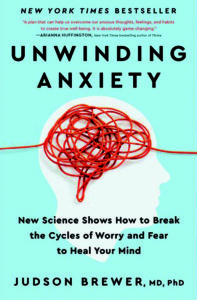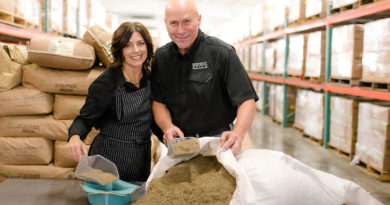Practical tips for Unwinding Anxiety
By M. Clare Haefner
 Anxiety is “a feeling of worry, nervousness, or unease, typically about an imminent event or something with an uncertain outcome.” This encompasses, well, just about anything, explains Judson Brewer, MD, Ph.D., in the first chapter of his new book, Unwinding Anxiety: New Science Shows How to Break the Cycles of Worry and Fear to Heal Your Mind (Avery, March 2021). “Since any event that is about to happen is imminent and the only thing we can be certain about is that things are uncertain, anxiety can rear its head in just about any place, situation, or time of day,” he writes.
Anxiety is “a feeling of worry, nervousness, or unease, typically about an imminent event or something with an uncertain outcome.” This encompasses, well, just about anything, explains Judson Brewer, MD, Ph.D., in the first chapter of his new book, Unwinding Anxiety: New Science Shows How to Break the Cycles of Worry and Fear to Heal Your Mind (Avery, March 2021). “Since any event that is about to happen is imminent and the only thing we can be certain about is that things are uncertain, anxiety can rear its head in just about any place, situation, or time of day,” he writes.
Almost all of us experience anxiety at one time or another. It’s a natural feeling born from fear that arises when our brains don’t have enough information to predict the future. Fear + Uncertainty = Anxiety. But some people are more anxious than others, with an inability to handle uncertainty compromising their ability to function normally.
Judson says nearly 264 million people worldwide had an anxiety disorder, and that’s before COVID-19 emerged. “An April 2020 study in the United States found that 13.6% of respondents reported severe psychological distress. That’s a whopping 250% increase compared to 2018, where only 3.9% reported this level of woe,” Judson writes. And like COVID-19, he says, anxiety is contagious. Talking to someone else who is anxious can trigger our own anxieties.
From the first few pages of Unwinding Anxiety, it was clear Dr. Jud knows what he’s talking about. The internationally renowned addiction psychiatrist and neuroscientist is an associate professor in the School of Public Health, and Medical School at Brown University. The book is the result of more than 20 years of experience with mindfulness training combined with his scientific research to help people break the cycle of bad habits and develop good ones.
It’s all about retraining your brain, he explains, comparing the process to riding a bike or driving a car. You start in first gear, mapping your habit loops. A habit loop starts with a trigger that leads to a behavior and then a reward. To overcome a bad habit, like anxiety or smoking or overeating, you have to become aware of all your triggers and find new rewards for your behaviors. Second gear is awareness. Asking yourself “What do I get from this?” and paying attention to your body’s sensations, your thoughts and emotions. Third gear involves “stepping out of your old habit loops and into the present moment.” The process seems easy, but as Judson explains, it requires a lot of work to retrain your brain.
The best part about Unwinding Anxiety is Judson’s practical, step-by-step guidance and relatable approach. He shares stories about patients he’s helped and about his own journey using mindfulness to overcome anxiety. He makes it feel possible to retrain the brain to break bad habits and develop new ones — he also provides the road map.
I’ve never thought of myself as an overly anxious person, but I definitely have bad habits — stress eating being the one with which I struggle most. In the couple of weeks I’ve been using Judson’s approach to map habit loops, I’ve gained a lot of awareness about how I’m feeling when something triggers me to start craving sweet or salty foods.
And Judson is right, simply recognizing what’s happening and asking myself why slows the craving and helps me avoid overeating. He’s also right that overcoming the bad habit isn’t going to be as simple as recognizing triggers, behaviors and rewards. It took time for my brain to learn that food was a reward for stress and, yes, anxiety, and it will take time to retrain my brain to reward myself in a healthier way than eating half a carton of ice cream or a bag of chips. But I’ve started the journey and am beginning to make some progress. I’ll keep rereading Unwinding Anxiety until I’ve created new habit loops by following Judson’s three gears to break the cycle.
If you’re struggling with anxiety, depression or other bad habits you want to break, pick up a copy of Unwinding Anxiety and follow Judson’s practical advice. It won’t cure you overnight, but it will help you feel like it’s possible to regain control over parts of your life — because recognizing you have a problem is a key part of finding a solution.


